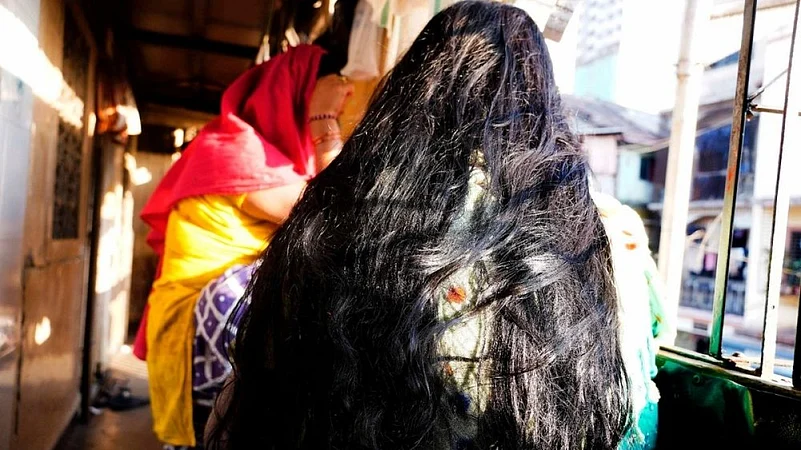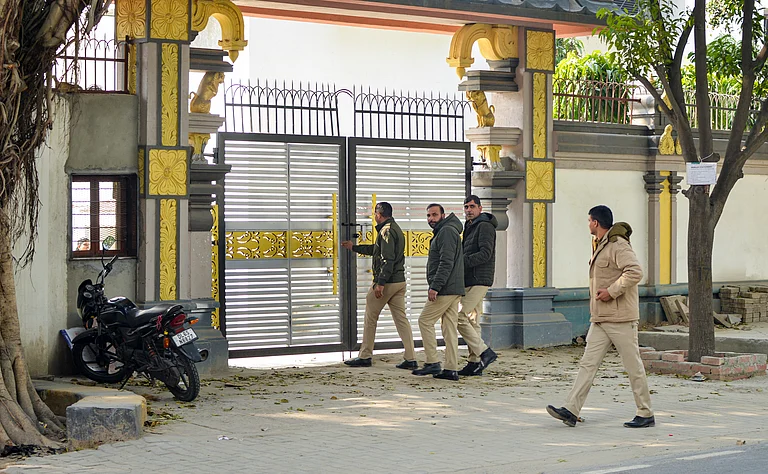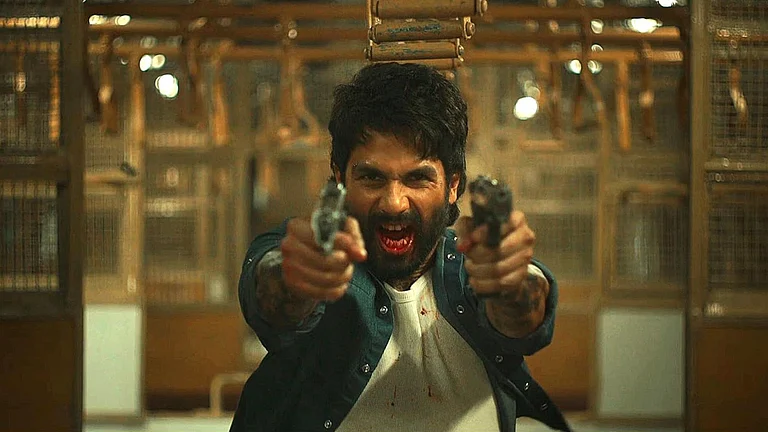All of us were stuffed into a holding area at the police station. It was not cramped enough to be called a corridor, but it wasn’t big enough to be called a room either. Two windows overlooked a courtyard. Inside, against the wall, was a long wooden stand in which rifles with bayonets rested in a row.
Two girls had wandered off to one of the windows, commencing a spitting match to see who could shoot paan spittle the farthest. The rest had sprawled out on the floor, chewing tobacco and gossiping loudly.
I stood alone, observing everything with bewilderment. After a few minutes, I sat down in a corner. Dark clouds of anxiety about my future began to gather. Would I be remanded to police custody? What if the magistrate decided to send me back to my village? All my grand dreams would be washed away like rainwater in a gutter.
An hour later, the door swung open and a majestic woman appeared along with a police officer. She wore a regal black sari with a golden border and held a king-sized cigarette in her long fingers. I observed her closely. Fair as an ivory statue, she radiated dignity. The room fell silent at the unspoken authority she commanded.
She then blew a lazy smoke ring as her eyes swept across the room one single time, examining the girls as casually as a customer would choose colourful birds in a pet shop. Once she was done, she closed the door gently and left with the officer.
I went up to the door to peep. The woman in the black and gold sari was seated across the tense DSP’s (Deputy Superintendent of Police) desk. A rusty fan was stirring the humid air. A Hindi film song squeaked from a transistor radio somewhere. At an appropriate distance from the desk, a group of eight madams stood respectfully, a gaggle of nervous anticipation. But where was my madam?
Gradually, I got the picture. The woman in black and gold was someone influential who had been called in by the madams to bail their girls out. She was now negotiating for the girls. But what about me? The madam of my cage was not here. Maybe this was her way of exacting revenge. It would not be a surprise for me to know that she had deliberately entrapped me.

For a brief moment, I allowed myself the escape of romantic fantasy — if only I had a lover who would come on a white horse to rescue me. A special someone in whose arms I could let go of this lonely fight. After a tiring night at work, I would welcome him inside me, to erase the pain of all the long hours spent with strangers. I snapped out of my bliss when I heard the sound of a chair being moved.
The woman had risen from her chair, and so had the DSP. I do not know what transpired between them, but he seemed almost deferential; he even offered her a polite handshake. The woman then turned to the madams who were quick to respond — they rushed into our room. Within minutes, they had swooped up their girls and left.
The woman, too, was about to leave when her eyes fell on me. Like an unclaimed body in a morgue, I too was alone within the four walls. Curious, she walked up to me slowly and peered at my face for some time, the cigarette in her fingers now a glowing stub.
‘Has no one come for you?’
I shook my head.
‘Where are you from?’
Third cage on the second lane.’
‘That pit-faced Sakhu Bai?’
She dropped the cigarette butt on the floor and crushed it under her heel. She appeared to be lost in thought as her eyes rested on me. I stood still with downcast eyes. At last, she came to some conclusion in her head and signalled me to follow her.
I was baffled but happy. I felt like a death-row prisoner who had been granted pardon on the eve of his hanging. Every cell in my body was thrumming with anticipation.
Outside the police station, a stately Ambassador car was waiting for us. The woman in black sat behind the wheel. I was still standing outside. She signalled me to join her. Timidly, I sat next to her. She started the engine and headed for Kamathipura.
‘What’s your name?’
I told her.
I wanted to know her name too but could not summon enough courage to ask. I had no clue who she was or where she was taking me. But it was enough for me to know that she wished me well and was taking me to a better life than Sakhu Bai’s depressing cage.
Turning into Shuklaji Street, she asked again, ‘Shall I drop you at your cage?’
I was taken aback. I did not know where I wanted to go, but returning to Sakhu Bai’s cages simply didn’t make sense. So I kept silent.
‘You don’t want to go back?’
‘No.’
‘Will you come to my place?’
I looked at her.
Her eyes were focused on the road ahead. The car moved slowly, negotiating both pedestrians and traffic.
I mustered up the courage to ask her a question. ‘What do I have to do at your place?’
She laughed and replied. ‘The same thing you did back at the old cage.’
‘I don’t know your name.’
She smiled warmly as she revealed it. ‘Gangubai.’

So that’s who the lady in black was — the fabled Gangubai. Even though Rehmat Khan Lala and Babu Rao were the two mafia dons who fought fierce battles over Kamathipura, it was GangbBai who reigned supreme over its fourteen streets. If they met Gangubai anywhere, they would bow before her. Every new police officer posted to this jurisdiction would first visit her to pay his respects. And if she ever visited the police station, senior officers would rise from their seats as if the home secretary had arrived.
Gangubai’s establishment was in the seventh lane of Kamathipura. It could not be called a cage because it did not have a smutty ambience. There were no doors with iron bars at the entrance. It was not cramped, and unlike cages, it was not grimy. Though it was not a numbered, air-conditioned bungalow, the place was clean and hygienic with freshly painted walls. There were long benches and glossy black wooden chairs, the kind one found in decent Irani restaurants.
Gangubai’s brothel was basically a giant warehouse packed with over a hundred and fifty girls. The establishment had two storeys. The ground floor was a large hall, while the upper floor had private rooms. These included Gangubai’s quarters — a self-contained apartment with two rooms and a kitchen. The drawing-room had a balcony that faced the road while the bedroom had an attached bathroom and toilet. She lived there alone.
(Excerpted from Cages: Love And Vengeance In A Red-Light District by Aabid Surti, Translated by Aalif Surti, with permission from Penguin Random House India. The novel was first published in Gujarati as ‘Vasaksajja’ (Lokpriya Prakashan, Bombay) in 1979)
(Aabid Surti is a painter, author, cartoonist, journalist, environmentalist, playwright and screenwriter. He was given a National Award in 1993 for writing a series of short stories called the ‘Teesri Aankh’)





















